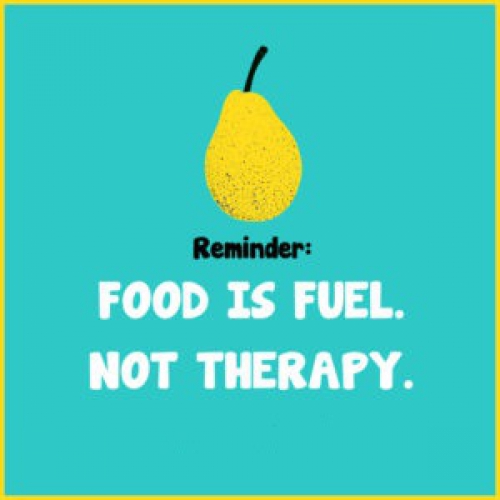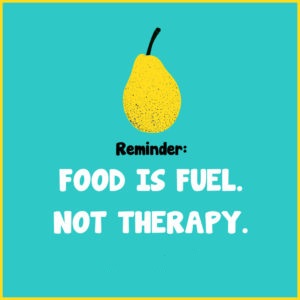Healthy Nurse, Healthy Nation™ Blog - Healthy Tactics To Overcome Emotional Eating
Published
As nurses, too often we are dealing with multiple emotions in a given day. Things at work and at home can be stressful and those high-calorie treats from coworkers or patients are just so readily available, that we hardly notice overindulgence. Before you reach for that feel good confection, try these strategies from other nurses!
 By the time nurses sit down for a meal, we’re often physically hungry and emotionally depleted. This can lead to an overindulgence without even realizing it. We are human and sometimes we eat just to cope with stress, anxiety, frustration, or exhaustion instead of hunger. The fact that high-calorie treats from coworkers or patients are readily available doesn’t always help us make healthy choices. How can we be mindful of this reminder that food is fuel NOT therapy and better curb emotional eating? We asked nurses like you to tell us about how they deal with this. Test out their suggestions and let us know if they helped or if you have any other suggestions in our REMINDER: Food Is Fuel Not Therapy discussion.
By the time nurses sit down for a meal, we’re often physically hungry and emotionally depleted. This can lead to an overindulgence without even realizing it. We are human and sometimes we eat just to cope with stress, anxiety, frustration, or exhaustion instead of hunger. The fact that high-calorie treats from coworkers or patients are readily available doesn’t always help us make healthy choices. How can we be mindful of this reminder that food is fuel NOT therapy and better curb emotional eating? We asked nurses like you to tell us about how they deal with this. Test out their suggestions and let us know if they helped or if you have any other suggestions in our REMINDER: Food Is Fuel Not Therapy discussion.Express yourself
Many nurses resort to overeating as a way of stuffing back their feelings. Try to let those feelings out in healthy ways. Consider keeping a notebook at your work-station where you can quickly write down what’s stressing you. Find a friend or coworker you can vent to. You may even try calling your own cell phone and leaving a voicemail about what’s bothering you. Saying the words out loud may give you the release you need.
Take a moment
Nurses frequently get very limited break time, if we take any at all. Instead of going directly to the break room to scarf down a sandwich, spend a few minutes someplace quiet. Having a moment to yourself can be a stress-reliever and will get you centered before diving into your meal or the next task. Stop by the hospital chapel or head outside to get an energy boost from the fresh air and enjoy a hit of nature.
Be prepared
You’re more likely to grab an unhealthy snack or eat treats if they’re readily available and you don’t have a healthy alternative. Bring your own healthy snacks and meals. “I stay away from places that will tempt me to overeat, like the cafeteria, and eat the lunch I packed from home,” says Missy Conover Walker, a nurse practitioner in Hunt Valley, Maryland who has lost over 100 lbs.
Fight stress all day
Make combating stress a priority throughout the day, not just during meal-time. Use these simple strategies to relieve stress on the job to feel calmer and more in control during your shift.
Think before you eat
You may tell yourself that you’re truly ravenous and you need that treat in front of you to satisfy your hunger. Before you indulge, ask yourself if you would eat an apple or a plate of steamed broccoli at that moment. If the answer is no, you’re probably not genuinely hungry and are just turning to sweets because they’re convenient. Use The American Diabetes Association’s Hunger Rating Scale to determine if you’re really hunger or eating for other reasons.
Show support in non-food ways
“Nurses are their own enemy. We frequently bring the goodies in ourselves,” says PACU nurse Brenda Murdough. Next time you think about bringing in a dozen donuts for the staff as a reward, consider a non-food treat. Buy a bouquet of flowers or a plant for the nurses’ station, buy a healthy kitchen gadget like a blender for the break room so colleagues can make smoothies, or purchase a pretty picture to hang in a common area. Try to show appreciation for your team without unhealthy treats.
Think outside the (bakery) box
“It’s great that nurses are being recognized, but we don’t need to be rewarded with cupcakes or cookies. That reinforcement with food is constant. It perpetuates that feeling of I deserve this,” says Heidi Wellnitz-Rye, an RN and certified group fitness instructor. “That instant sugar just gives you a quick hit and makes you feel tired later.” Think about what you do deserve and what would be truly fulfilling for you. Work towards achieving those goals – enough sleep, quality time with loved ones, fulfilling work or time to exercise.
Get to the root of the issue
Keep track of the times you turn to food to deal with stress or frustration. You may notice a pattern. If you realize sharing bad news with patients’ families leads you to console yourself with chips from the vending machine or confrontations with coworkers send you trolling for treats, you can recognize that behavior and find healthier outlets for those feelings. “Overcoming emotional eating is about more than going on a meal plan or being consistent with the gym. It’s a holistic process of figuring out the reason for your behavior and coming up with other ways to cope,” says Conover Walker.
Forgive yourself
If you’ve experienced a slip up, accept it and move on. Just because you may have mindlessly shoved a cookie into your mouth, doesn’t mean you need to eat the rest of the box. Think of it this way: If you got into a fender bender, you’re not going to crash the whole car afterwards. You repair the damage and continue moving forward.
Have you found other healthy ways to overcome emotional eating? Join in on our discussion REMINDER: Food Is Fuel Not Therapy. Tell us if these tactics are helpful and share your tips, tricks, and real-life inspiration about living a healthier life. Show us examples of your healthy eating on our Facebook, Twitter, Instagram. Tag a nurse and us #HealthyNurse.
Source list:
Centers for Disease Control. Eating Habits.
American Diabetes Association. Take Charge: Emotions and Eating.
American Diabetes Association. Get In Touch with Your Appetite. The Hunger Rating Scale.
Links updated 12/12/22

Have you joined the Healthy Nurse, Healthy Nation (HNHN) Grand Challenge yet? Join us today!
Blog Nutrition
05/24/2017 8:06am CDT



Post a Comment or Question